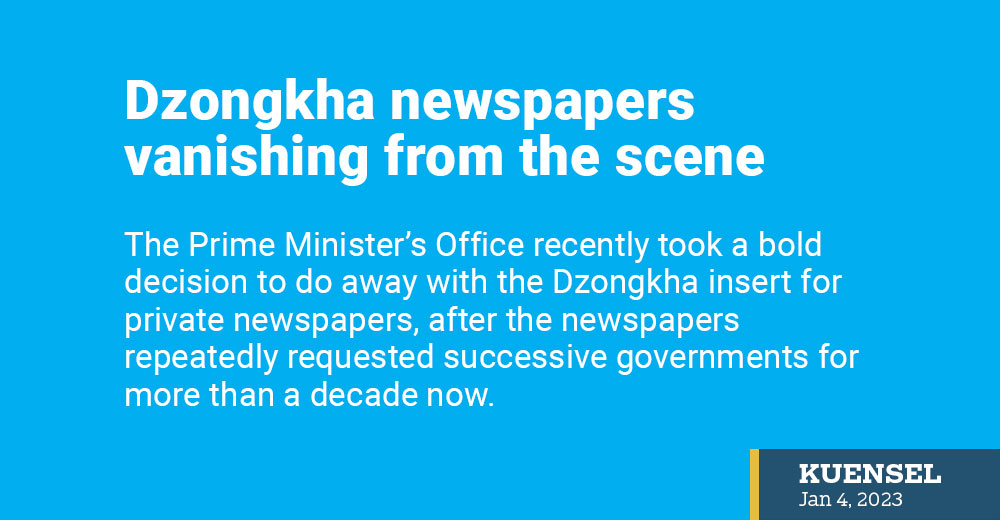… to help private newspapers, the govt. lifted the mandatory requirement of Dzongkha edition for private newspapers
Rinzin Wangchuk
The Prime Minister’s Office recently took a bold decision to do away with the Dzongkha insert for private newspapers, after the newspapers repeatedly requested successive governments for more than a decade now.
This is one of the major milestones for the five private newspapers, Bhutan Times, Bhutan Today, Business Bhutan, The Bhutanese and The Journalist, since they are not required to prepare, print and deliver their publications in Dzongkha.
The decision was implemented immediately after the Bhutan InfoComm and Media Authority (BICMA) issued a notification of discontinuation of Dzongkha insert on December 23 last year.
Prime Minister Dr Lotay Tshering during the meeting with the stakeholders said that the government was ready to lift the mandatory publication of Dzongkha edition if it was not serving its purpose.
How Dzongkha edition became an insert?
It is mandatory for the English newspapers in the country to publish a Dzongkha edition, and one of the policy directives of the BICMA while issuing a license to the newspapers and magazines.
BICMA issued licenses to the private newspapers on the condition that the English newspapers must publish a Dzongkha edition with an independent Dzongkha editorial team.
Bhutan Observer (Druk Nyelug), one of the first private newspapers, started its publication with an equal number of a team for both Dzongkha and English in 2006. However, they had to discontinue the Dzongkha edition as it was too expensive to publish a separate edition with only a few buyers and very less advertisements.
BICMA issued a warning letter to Bhutan Observer to revoke the license if the proprietor discontinues the Dzongkha edition after the paper suspended it for two months in 2007. They resumed publishing Dzongkha edition with lesser pages and lesser staff till 2011. The edition was then reduced into inserts and finally shut down.
By then, four independent Dzongkha newspapers, Druk Nyetshul, Druk Yoedzer, Gyalchi Sarshog and Druk Melong were in the market competing with each other for sustainability. However, except Gyalchi Sarshog and Kuensel, all Dzongkha newspapers shut down one after another over the last 10 years.
Why the decision took long?
The mandate to have an equivalent Dzongkha edition in English publication had become a huge financial burden and impacted the sustainability of media houses. And they were not helping in promoting the national language, they resorted to publishing a Namthar (biography) or Driglam Namzha (Bhutanese Etiquette) written by scholars as insert breaching the licensing requirement of a Dzongkha edition.
“Which is why we had been requesting the government, Ministry of Information and Communications, and BICMA to do away than have a poor quality of Dzongkha inserts since 2011,” a private newspaper proprietor said.
In their proposal submitted to BICMA in 2011, they requested the licensing authority that English-language newspapers should be freed of the obligation to come up with their Dzongkha editions.
“More than helping Dzongkha to improve its standard, it is harming the national language,” they stated in their submission. They argued that due to the lack of a professional Dzongkha news team, many Dzongkha words were misspelt, sentences were wrongly structured, often deviating from acceptable grammatical norms, and creating confusion rather than clarity.
BICMA on April 18, 2011, wrote to the media houses stating that they received the directive from the government that stopping the Dzongkha editions of the English newspapers at this stage would be tantamount to revoking the policy decisions of the parliament as well as that of the government.
So BICMA asked all newspapers to continue publishing the Dzongkha editions and have the responsibility to publish Dzongkha editions. In its earlier statement to the media houses, BICMA said its licensing requirement of a Dzongkha edition was based on the decision of the 281st Council of Cabinet Ministers (CCM), which was held on November 27, 2005, and on the resolution of the 87th session of the National Assembly (NA) in June 2007.
The NA had resolved that based on the contents of the Royal Kasho and the resolutions of the past NA sessions, “…efforts should be made to publish notification in our national language and the contents and quality of both the Dzongkha and English language newspapers should be same”.
Because of this standing decision, the successive governments and MoIC could not entertain the proposals to do away with the Dzongkha editions from private media houses.
“It is a great relief for us,” proprietors and editors from private newspapers said during the meeting with the prime minister. “The requirement to publish the Dzongkha edition was an additional burden to the ailing media houses.”
In order to offset possible negative effects of this decision, one editor also suggested that the government should provide subsidies to those newspapers that are being published in Dzongkha only. “The special subsidies be provided either as a special programme of content creation funding facility (CCFF) subsidizing their content production or as a regular annual grant distributed directly to the newspapers like seven private newspapers are receiving a grant of Nu 4.3 million annually today as subsidies to sustain them,” he said.
Lyonchhen said that both Kuensel and Gyalchi Sarshog to come up with a comprehensive proposal on how the government could help sustain Dzongkha editions and promote the national language.
The Department of Kuensel in 1965 started the first Dzongkha news bulletin and named it Kuensel.
The insert was reduced from four pages to a single page. However, there was no objection from the monitoring authorities.


